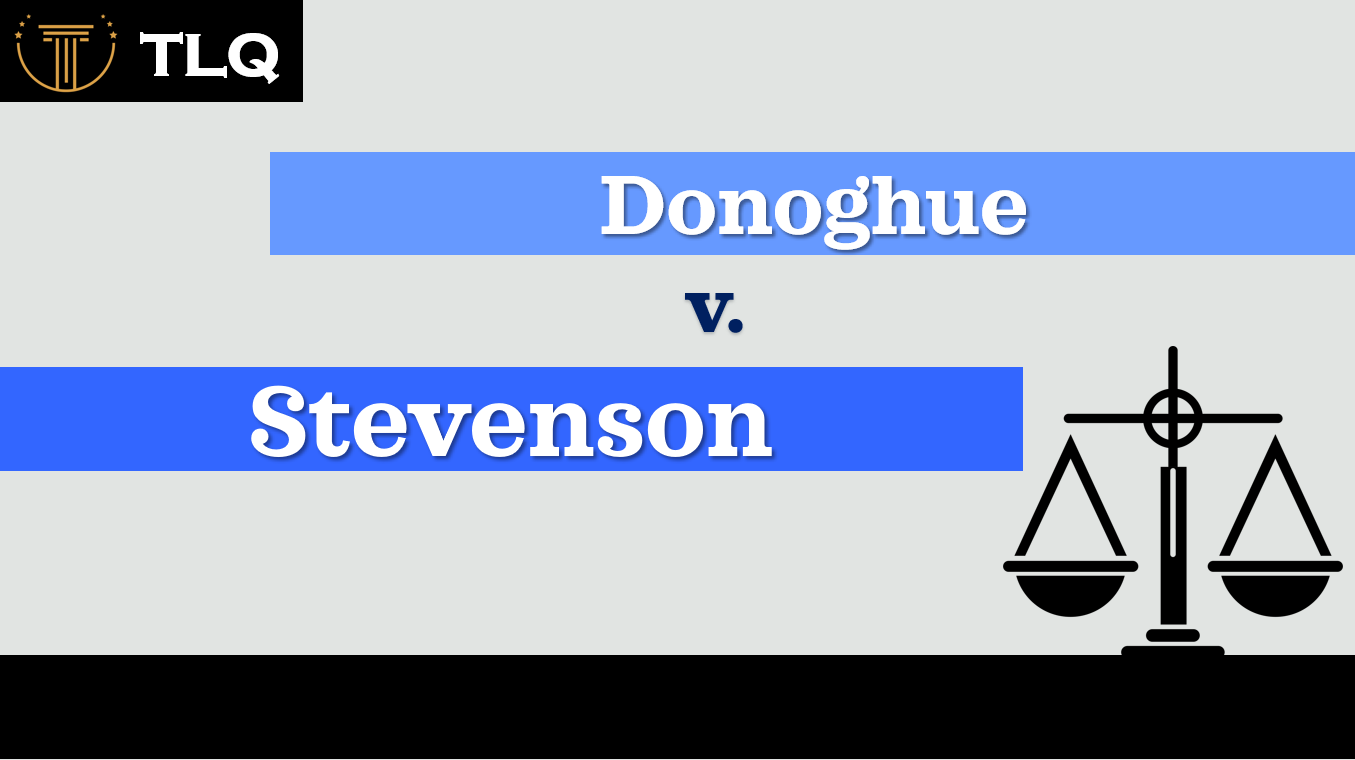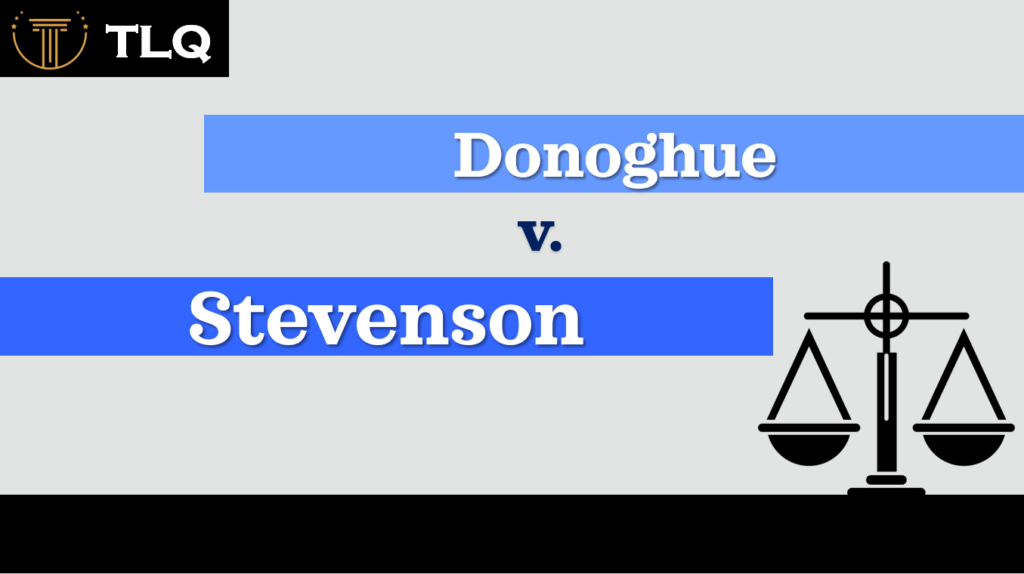Published On: 26th April, 2024

Authored By: Nirmala Bobby Panicker
De Montfort University
Donoghue v Stevenson [1932] AC 562 was a foundational decision in Scottish delict law and English tort law by the House of Lords. It established the broad guidelines by which one would be required to exercise a duty of care towards another, giving rise to the contemporary notion of negligence. It is also famously known as the “Paisley snail” or “snail in the bottle” case.
Prior to Donoghue v Stevenson, liability for personal injury in tort usually depended upon showing physical damage inflicted directly (trespass to the person) or indirectly (trespass on the case). Mrs. Donoghue’s incapacitation from the ingestion of a harmful substance initially seemed to lack legal grounds for a claim, as existing precedents did not encompass such circumstances. However, the landmark decision marked a pivotal shift in tort law, introducing a novel liability concept not tied to established tort categories. This marked an evolutionary progression in common law, transitioning from a strict liability framework rooted in direct physical contact to a fault-based system predicated on the occurrence of injury. This evolution was taken further in the later decision of Letang v Cooper [1965] 1 QB 232[1] when it was held that actions should not be jointly pleaded in trespass and negligence, but in negligence alone.
FACTS:
On the 26th of August, 1928, the Appellant partook in the consumption of a bottle of ginger beer, manufactured by the respondent, procured by a friend from a retailer. Unbeknownst to her, the bottle harbored the decomposed remains of a snail, an imperfection that eluded detection until a substantial portion of the contents had been consumed. Consequently, the appellant, asserting her allegations as truthful at this juncture, claimed to have suffered from shock and severe gastroenteritis. In response to these circumstances, she initiated legal proceedings against the manufacturers, forming the basis of the present appeal.
The crux of her case revolves around the contention that the respondent, being the producers of a consumable article encased in a container impervious to inspection, bore a duty towards her as the consumer. This duty, as posited, obligated the respondent to exercise diligence in ensuring the absence of noxious elements in the goods. The appellant asserts that the respondent neglected this duty, and consequently, they are liable for any ensuing damages resulting from such neglect.
Following certain amendments, now deemed immaterial, the case underwent adjudication before the Lord Ordinary. The Lord Ordinary rejected the respondent’s plea in law and permitted the initiation of a formal inquiry (proof). However, this decision was overturned by the second Division of the Court of Session, and it is this judgment that forms the basis of the current appeal.
Legal Issue:
The pivotal question at the heart of this case pertained to the existence of a duty of care on the part of Mr. Stevenson towards Mrs. Donoghue. During this period, the legal landscape within the realm of tort lacked a firmly established principle mandating individuals to exercise reasonable care to prevent harm to others. The court was thus tasked with determining whether, in his capacity as the manufacturer of the ginger beer, Stevenson bore a duty of care towards Mrs. Donoghue, the end consumer. The crux of this deliberation rested on the inquiry into whether Stevenson was obligated to ensure that the product he produced was inherently safe for Mrs. Donoghue’s consumption.
JUDGEMENT:
In the course of the legal proceedings, Mrs. Donoghue asserted that Mr. Stevenson bore a duty of care towards his customers, particularly those consuming his ginger beer, to establish and maintain an effective system for cleaning his bottles and preventing the inclusion of snails. Conversely, Mr. Stevenson refuted any presence of snails in his bottles, contending that Mrs. Donoghue’s health issues were attributable to her own pre-existing health conditions. He further contested the substantiation of facts, denied any harm inflicted upon Mrs. Donoghue, and challenged the asserted damages as excessive.
The initial adjudication took place in the Outer House of the Court of Sessions under the purview of Lord Moncrieff. Notably, the owner of the café was initially implicated as a co-defendant but was subsequently removed from the proceedings due to the absence of a contractual relationship with Mrs. Donoghue. This decision was informed by the fact that the ginger beer was purchased by Mrs. Donoghue’s friend, and the café owner had no practical means of inspecting the contents of the bottle.
Lord Moncrieff, in his adjudication, rejected the argument and associated case law positing that a contractual relationship was a prerequisite for incurring liability in cases of negligence concerning goods prepared for consumption. He characterized this principle as unduly narrow in scope. Subsequently, Stevenson pursued an appeal to the Inner House of the Court of Sessions, which comprised four judges, including those who had previously ruled on the case of Mullen v AG Barr & Co Ltd. In that precedent, it had been determined that no duty of care could arise in the absence of a contractual relationship. The majority of judges in the Inner House allowed Stevenson’s appeal, with Lord Hunter once again registering a dissenting opinion.
Mrs. Donoghue, undeterred, sought further recourse by appealing to the House of Lords. The panel of judges hearing her appeal included Lord Atkin, Lord Thankerton, Lord Tomlin, Lord Buckmaster, and Lord MacMillan. Counsel for Mrs. Donoghue argued that Stevenson bore a duty of care independent of any contractual arrangement, citing the inherent inability to inspect the bottles containing the ginger beer and their intended purpose for human consumption.
Stevenson’s legal representatives contended that established law in both England and Scotland dictated that manufacturers owed no duty to individuals with whom they lacked a direct contractual relationship. They emphasized that the exceptions carved out in the laws of both jurisdictions did not apply to this case, asserting that the ginger beer was not inherently dangerous, and Stevenson was unaware of any potential danger associated with the product.
In a decision that was not unanimous, the House of Lords ruled in favor of Donoghue. Lord Atkin, in particular, underscored the significance of the case in the context of public health. He articulated that the moral imperative to love and care for one’s neighbor translated into the legal principle of exercising reasonable care to prevent foreseeable harm. The notion of “neighbor” was expounded upon, with Lord Atkin narrowing it down to someone directly affected by one’s actions or omissions. This person, he argued, must be contemplated when undertaking such actions or omissions, emphasizing the duty to avoid causing injury to one’s neighbor.
In the eloquent words of Lord Macmillan, he expounded on the legal principle at play, asserting that an individual who, for financial gain, engages in the business of manufacturing food and drink items for public consumption assumes a duty to exercise care in the production of those items. This duty is owed specifically to those individuals whom the manufacturer intends to be consumers of the products. As the manufacturer creates these commodities for human consumption, with a clear intention and anticipation that they will be consumed, he willingly establishes a relationship with all potential consumers of his products.
By virtue of this relationship, which the manufacturer actively seeks for his own objectives, he becomes bound by a duty to take reasonable care to prevent harm to the consumers. This duty extends to avoiding any transformation of an article, issued as wholesome and innocent, into one that poses a danger to life and health due to the manufacturer’s own negligence. Lord Macmillan’s argument emphasizes the responsibility inherent in the act of manufacturing goods intended for human consumption and underscores the legal obligation to ensure the safety and integrity of such products.[2]
Impact of Donoghue v Stevenson:
The law of negligence in the UK and other common law jurisdictions has been significantly impacted by the Donoghue v Stevenson[3] The case established a standard for the amount of care that a manufacturer must take to ensure the safety of his products as well as the duty of care that manufacturers owe to consumers. The judgement also upheld the rule that a producer may be held accountable for damages brought about by a flaw in his product, even if the flaw was unknown to him at the time of production.
CONCLUSION:
In conclusion, the jurisprudential significance of Donoghue v Stevenson resonates as a seminal milestone in the evolution of negligence law within the United Kingdom, casting its influence across various common law jurisdictions. This landmark case has enshrined the fundamental principle that manufacturers bear an obligation to exercise reasonable care, ensuring the safety of their products for consumers. It has not only articulated the duty of care expected from manufacturers but has also established a benchmark for the requisite level of diligence that must be upheld to discharge this responsibility.
Donoghue v Stevenson, through its enduring legacy, has effectively shaped the contours of product liability law, emphasizing the paramount importance of consumer safety. The case signifies a crucial shift from a strict liability paradigm based on physical contact to a fault-based system, thereby broadening the scope of actionable claims. The legal precedent set by this case has resonated far beyond its immediate confines, influencing subsequent judgments and underpinning the broader framework of negligence law. In essence, Donoghue v Stevenson stands as a testament to the enduring impact of a singular legal decision on the trajectory of legal principles, particularly concerning the duty of care owed by manufacturers to consumers.
Reference(s):
[1] Letang v Cooper [1965] 1 QB 232.
[2]Donoghue v Stevenson [1932] All ER Rep 1.
[3] Donoghue v Stevenson [1932] AC 562





